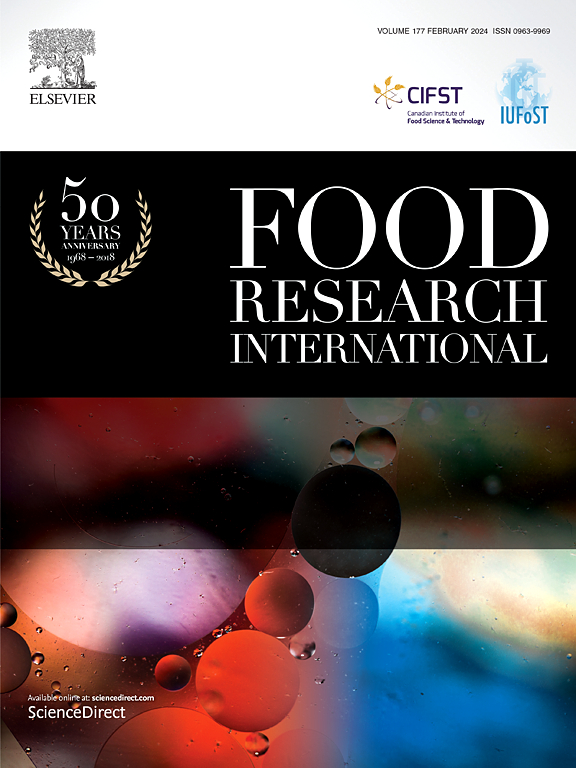用深海矿物肥栽培糙米对结肠癌的体外和体内研究
IF 7
1区 农林科学
Q1 FOOD SCIENCE & TECHNOLOGY
引用次数: 0
摘要
以氮氧甲烷(AOM)/葡聚糖硫酸钠(DSS)小鼠为实验对象,通过细胞凋亡、炎症反应和肠道菌群组成,探讨了深海矿物肥培养的天然梦糙米(NBR)对炎症性结直肠癌小鼠模型的抑制作用。与传统糙米和有机糙米相比,丁腈橡胶含有更高水平的必需矿物质和γ-米醇,此外还具有强大的抗氧化能力,总黄酮和酚类含量也有所提高。它还上调细胞周期阻滞因子,包括p53和p21,以及促凋亡标志物,如Bax、Bak、Bim、Caspase 9和Caspase 3。同时,抗凋亡标志物如Bcl-2和Bcl-xL下调,加速细胞死亡和细胞周期阻滞。在AOM/DSS小鼠模型中,日粮摄入NBR改善了黏膜完整性,降低了血清、脾脏细胞和结肠组织中炎症因子(IL-1β、IL-6、IFN-γ)的表达。它还增加抗炎细胞因子IL-10的水平,诱导细胞周期阻滞,诱导促凋亡因子的表达,抑制结肠抗凋亡因子的表达。此外,丁腈橡胶改变了肠道菌群组成,提高了乳酸杆菌和粪杆菌的含量,降低了铁杆菌科和沙氏粘菌的含量。这些结果强调了NBR作为一种功能性膳食来源的潜力,它可以通过增强生物活性化合物、调节细胞和炎症反应以及调节肠道微生物群来预防结直肠癌。本文章由计算机程序翻译,如有差异,请以英文原文为准。

Impact of brown rice cultivated with deep-sea mineral fertiliser on colon cancer in vitro and in vivo studies
The suppressive effects of Naturaldream Brown Rice (NBR), cultivated with deep-sea mineral fertiliser in an azoxymethane (AOM)/ dextran sulphate sodium (DSS) mouse model of inflammatory colorectal cancer were explored by focusing on apoptosis, inflammatory responses and gut microbiota composition. NBR contains significantly higher levels of essential mineral contents and γ-oryzanol compared to conventional brown rice and organic brown rice, in addition to exhibiting robust antioxidant capacity and elevated total flavonoid and phenolic content. It also up-regulated cell cycle arrest factors, including p53 and p21 and pro-apoptotic markers such as Bax, Bak, Bim, Caspase 9 and Caspase 3. Concurrently, anti-apoptotic markers such as Bcl-2 and Bcl-xL were downregulated, enhancing cell death and cell cycle arrest. In the AOM/DSS mouse model, dietary intake of NBR improved mucosal integrity and reduced the expression of inflammatory cytokines (IL-1β, IL-6, IFN-γ) in serum, spleen cells and colon tissue. It also increased levels of the anti-inflammatory cytokines IL-10, induced cell cycle arrest, induced the expression of pro-apoptotic factors and inhibited the expression of anti-apoptotic factors in the colon. Furthermore, NBR altered the gut microbiota composition, elevating Lactobacillus and Faecalibacterium while decreasing Deferribacteraceae and Mucispirillum schaedleri. These results highlight the potential of NBR as a functional dietary source for colorectal cancer prevention through the enhancement of bioactive compounds, regulation of cellular and inflammatory responses and modulation of gut microbiota.
求助全文
通过发布文献求助,成功后即可免费获取论文全文。
去求助
来源期刊

Food Research International
工程技术-食品科技
CiteScore
12.50
自引率
7.40%
发文量
1183
审稿时长
79 days
期刊介绍:
Food Research International serves as a rapid dissemination platform for significant and impactful research in food science, technology, engineering, and nutrition. The journal focuses on publishing novel, high-quality, and high-impact review papers, original research papers, and letters to the editors across various disciplines in the science and technology of food. Additionally, it follows a policy of publishing special issues on topical and emergent subjects in food research or related areas. Selected, peer-reviewed papers from scientific meetings, workshops, and conferences on the science, technology, and engineering of foods are also featured in special issues.
 求助内容:
求助内容: 应助结果提醒方式:
应助结果提醒方式:


